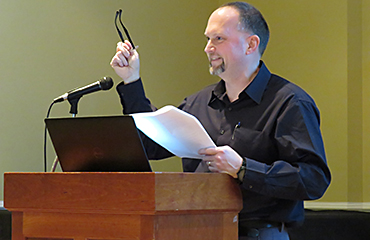
People watch violent television because they are uneasy about death, and violent television bolsters their “terror management defenses,” according to Lander University Professor of Psychology Dr. Jonathan Bassett.
Bassett, author of “Death on the Small Screen: The Psychology of Viewing Violent Television,” published by McFarland Press, spoke at the Greenwood Arts Center on Tuesday, Feb. 7, as part of Lander’s community lecture series.
He said that people want to believe that “life is fair, and that the world is just,” and so they identify with protagonists “whose violence is presented as heroic, righteous, and justified. Just as the hero stands over the body of his vanquished foe, so too does the viewer feel they have triumphed over death.”
Bassett said that “it’s only the losers of violent encounters” who perish in shows like “Game of Thrones” -- “the winners endure on the screen and in the viewer’s imagination.”
People are attracted to “exceptionally resilient characters who prove impossible to kill by surviving repeated attempts on their life against seemingly insurmountable odds,” he said, citing action hero Chuck Norris as an example.
Another way that violent television “buttresses denial of death is by focusing on death as due to violent rather than natural causes.” Viewers think that “death from violent causes can be avoided,” so they are reassured, he said.
Bassett also addressed the question of whether watching violence on television makes people more violent. He said that there had been “six decades of social science research on the topic, and people are still somewhat divided about it.” A causal connection hasn’t really been established, he said, but it probably “plays some contributing role.”
He advised those in the audience to “monitor your viewing habits, in the same way that you would monitor your diet.”